Leadership Challenges in the Contemporary Business Environment
VerifiedAdded on 2022/12/15
|11
|3482
|77
Essay
AI Summary
This essay delves into the significant challenges confronting leaders in the contemporary business world. It explores various aspects, including the development of effective managerial skills such as time management, decision-making, and strategic thinking. The essay also examines the challenges related to inspiring and motivating employees, fostering employee skill development through mentoring and coaching, and effectively managing teams. Moreover, it addresses the complexities of change management and the effective handling of internal stakeholders and organizational politics. The author provides recommendations on how to improve the quality of leadership and emphasizes the need for a shift in the perception of leadership within modern business firms. The essay highlights the importance of recognizing leaders as individuals with imperfections and reducing their workload to enable them to overcome challenges and contribute meaningfully to organizational growth. This assignment provides a comprehensive overview of the leadership challenges, offering insights into how these challenges can be managed and overcome.
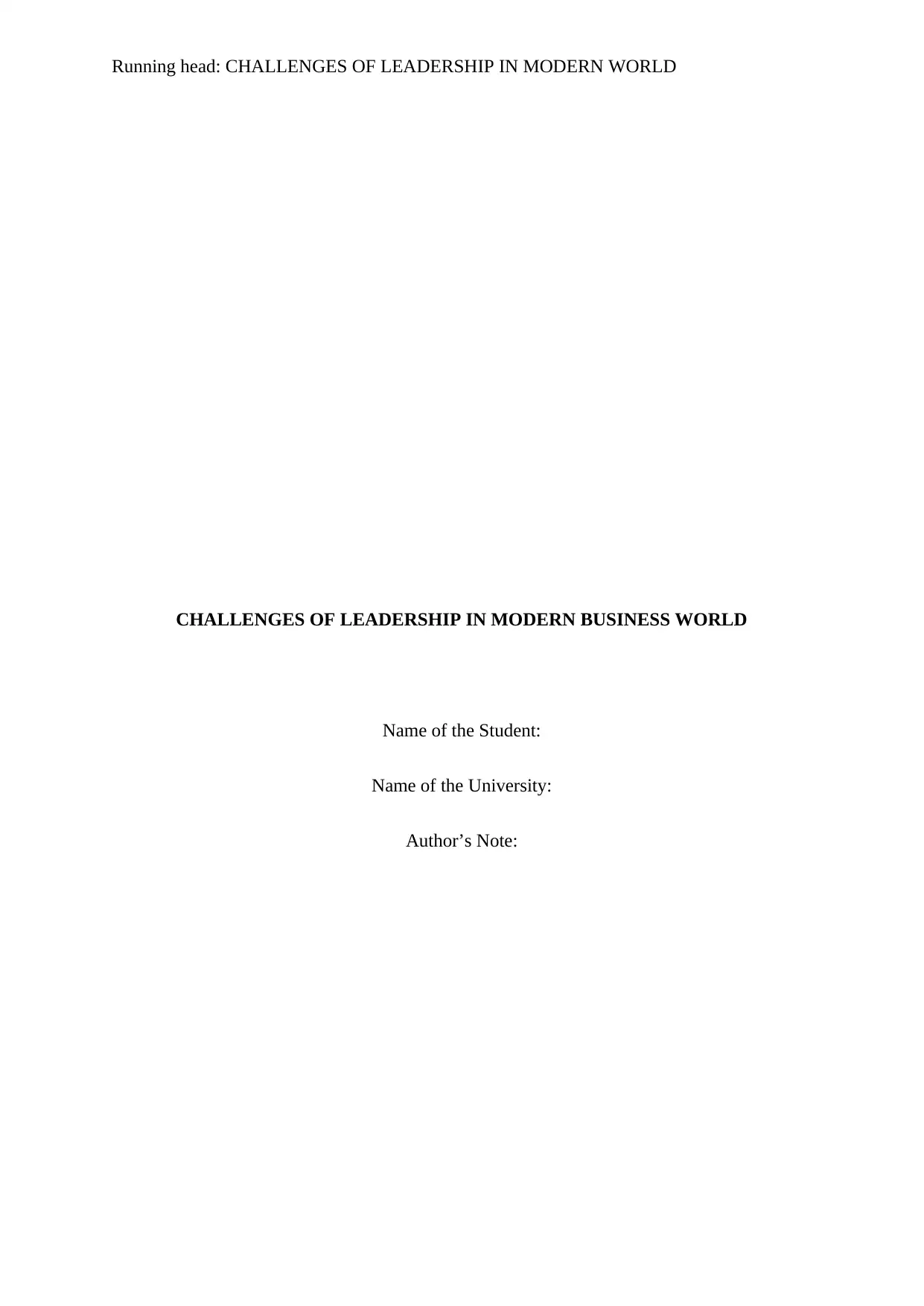
Running head: CHALLENGES OF LEADERSHIP IN MODERN WORLD
CHALLENGES OF LEADERSHIP IN MODERN BUSINESS WORLD
Name of the Student:
Name of the University:
Author’s Note:
CHALLENGES OF LEADERSHIP IN MODERN BUSINESS WORLD
Name of the Student:
Name of the University:
Author’s Note:
Paraphrase This Document
Need a fresh take? Get an instant paraphrase of this document with our AI Paraphraser
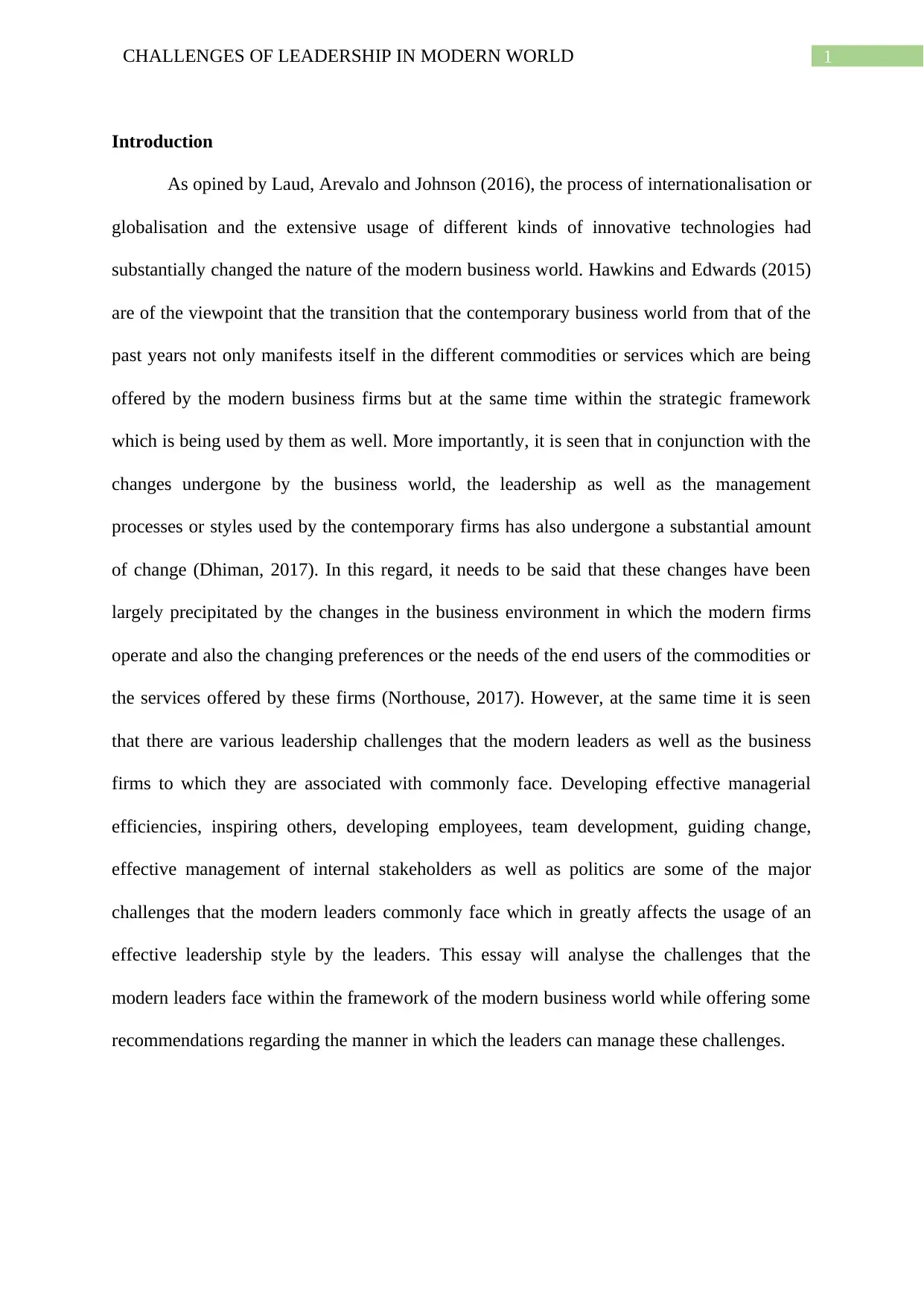
1CHALLENGES OF LEADERSHIP IN MODERN WORLD
Introduction
As opined by Laud, Arevalo and Johnson (2016), the process of internationalisation or
globalisation and the extensive usage of different kinds of innovative technologies had
substantially changed the nature of the modern business world. Hawkins and Edwards (2015)
are of the viewpoint that the transition that the contemporary business world from that of the
past years not only manifests itself in the different commodities or services which are being
offered by the modern business firms but at the same time within the strategic framework
which is being used by them as well. More importantly, it is seen that in conjunction with the
changes undergone by the business world, the leadership as well as the management
processes or styles used by the contemporary firms has also undergone a substantial amount
of change (Dhiman, 2017). In this regard, it needs to be said that these changes have been
largely precipitated by the changes in the business environment in which the modern firms
operate and also the changing preferences or the needs of the end users of the commodities or
the services offered by these firms (Northouse, 2017). However, at the same time it is seen
that there are various leadership challenges that the modern leaders as well as the business
firms to which they are associated with commonly face. Developing effective managerial
efficiencies, inspiring others, developing employees, team development, guiding change,
effective management of internal stakeholders as well as politics are some of the major
challenges that the modern leaders commonly face which in greatly affects the usage of an
effective leadership style by the leaders. This essay will analyse the challenges that the
modern leaders face within the framework of the modern business world while offering some
recommendations regarding the manner in which the leaders can manage these challenges.
Introduction
As opined by Laud, Arevalo and Johnson (2016), the process of internationalisation or
globalisation and the extensive usage of different kinds of innovative technologies had
substantially changed the nature of the modern business world. Hawkins and Edwards (2015)
are of the viewpoint that the transition that the contemporary business world from that of the
past years not only manifests itself in the different commodities or services which are being
offered by the modern business firms but at the same time within the strategic framework
which is being used by them as well. More importantly, it is seen that in conjunction with the
changes undergone by the business world, the leadership as well as the management
processes or styles used by the contemporary firms has also undergone a substantial amount
of change (Dhiman, 2017). In this regard, it needs to be said that these changes have been
largely precipitated by the changes in the business environment in which the modern firms
operate and also the changing preferences or the needs of the end users of the commodities or
the services offered by these firms (Northouse, 2017). However, at the same time it is seen
that there are various leadership challenges that the modern leaders as well as the business
firms to which they are associated with commonly face. Developing effective managerial
efficiencies, inspiring others, developing employees, team development, guiding change,
effective management of internal stakeholders as well as politics are some of the major
challenges that the modern leaders commonly face which in greatly affects the usage of an
effective leadership style by the leaders. This essay will analyse the challenges that the
modern leaders face within the framework of the modern business world while offering some
recommendations regarding the manner in which the leaders can manage these challenges.
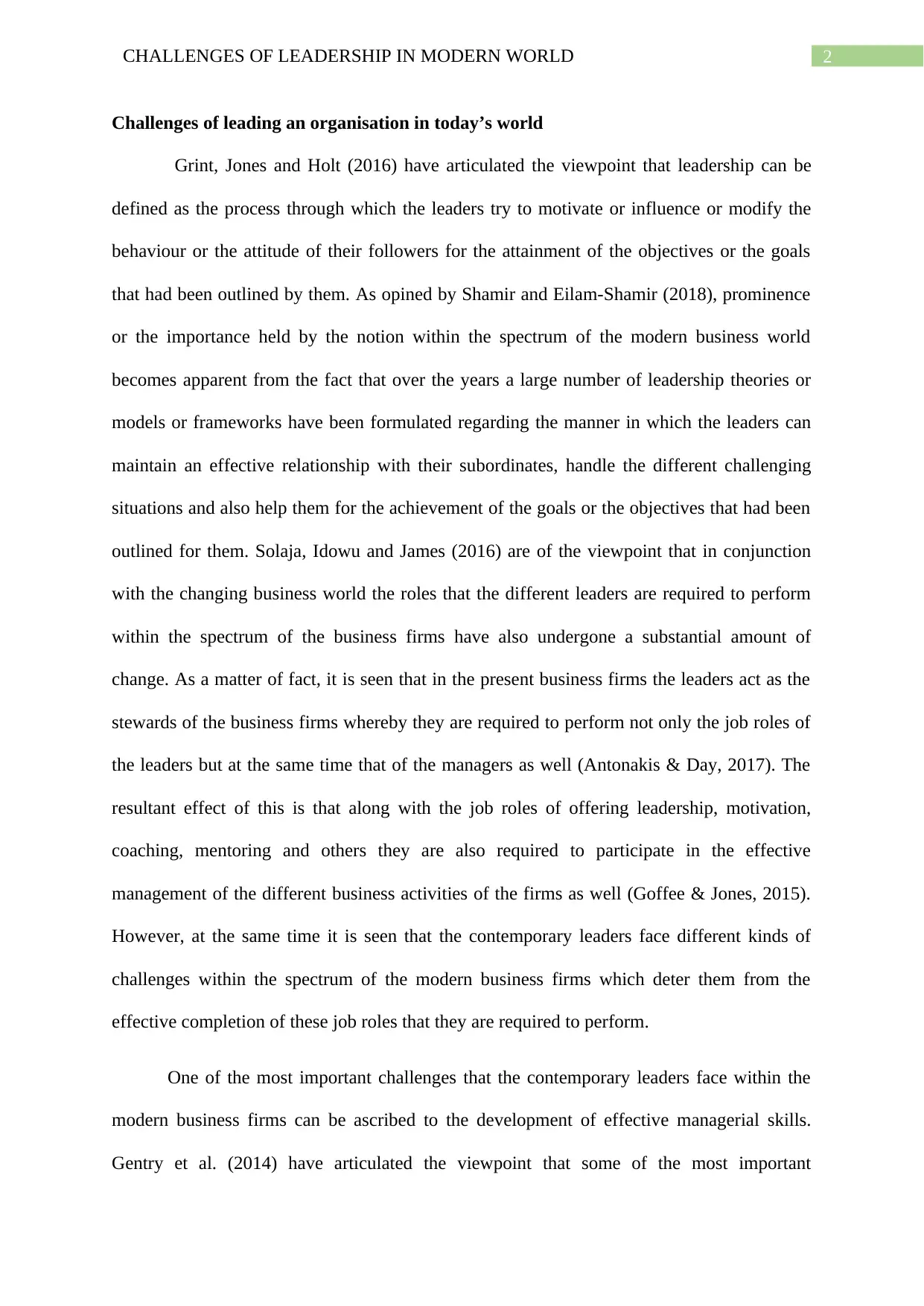
2CHALLENGES OF LEADERSHIP IN MODERN WORLD
Challenges of leading an organisation in today’s world
Grint, Jones and Holt (2016) have articulated the viewpoint that leadership can be
defined as the process through which the leaders try to motivate or influence or modify the
behaviour or the attitude of their followers for the attainment of the objectives or the goals
that had been outlined by them. As opined by Shamir and Eilam-Shamir (2018), prominence
or the importance held by the notion within the spectrum of the modern business world
becomes apparent from the fact that over the years a large number of leadership theories or
models or frameworks have been formulated regarding the manner in which the leaders can
maintain an effective relationship with their subordinates, handle the different challenging
situations and also help them for the achievement of the goals or the objectives that had been
outlined for them. Solaja, Idowu and James (2016) are of the viewpoint that in conjunction
with the changing business world the roles that the different leaders are required to perform
within the spectrum of the business firms have also undergone a substantial amount of
change. As a matter of fact, it is seen that in the present business firms the leaders act as the
stewards of the business firms whereby they are required to perform not only the job roles of
the leaders but at the same time that of the managers as well (Antonakis & Day, 2017). The
resultant effect of this is that along with the job roles of offering leadership, motivation,
coaching, mentoring and others they are also required to participate in the effective
management of the different business activities of the firms as well (Goffee & Jones, 2015).
However, at the same time it is seen that the contemporary leaders face different kinds of
challenges within the spectrum of the modern business firms which deter them from the
effective completion of these job roles that they are required to perform.
One of the most important challenges that the contemporary leaders face within the
modern business firms can be ascribed to the development of effective managerial skills.
Gentry et al. (2014) have articulated the viewpoint that some of the most important
Challenges of leading an organisation in today’s world
Grint, Jones and Holt (2016) have articulated the viewpoint that leadership can be
defined as the process through which the leaders try to motivate or influence or modify the
behaviour or the attitude of their followers for the attainment of the objectives or the goals
that had been outlined by them. As opined by Shamir and Eilam-Shamir (2018), prominence
or the importance held by the notion within the spectrum of the modern business world
becomes apparent from the fact that over the years a large number of leadership theories or
models or frameworks have been formulated regarding the manner in which the leaders can
maintain an effective relationship with their subordinates, handle the different challenging
situations and also help them for the achievement of the goals or the objectives that had been
outlined for them. Solaja, Idowu and James (2016) are of the viewpoint that in conjunction
with the changing business world the roles that the different leaders are required to perform
within the spectrum of the business firms have also undergone a substantial amount of
change. As a matter of fact, it is seen that in the present business firms the leaders act as the
stewards of the business firms whereby they are required to perform not only the job roles of
the leaders but at the same time that of the managers as well (Antonakis & Day, 2017). The
resultant effect of this is that along with the job roles of offering leadership, motivation,
coaching, mentoring and others they are also required to participate in the effective
management of the different business activities of the firms as well (Goffee & Jones, 2015).
However, at the same time it is seen that the contemporary leaders face different kinds of
challenges within the spectrum of the modern business firms which deter them from the
effective completion of these job roles that they are required to perform.
One of the most important challenges that the contemporary leaders face within the
modern business firms can be ascribed to the development of effective managerial skills.
Gentry et al. (2014) have articulated the viewpoint that some of the most important
⊘ This is a preview!⊘
Do you want full access?
Subscribe today to unlock all pages.

Trusted by 1+ million students worldwide
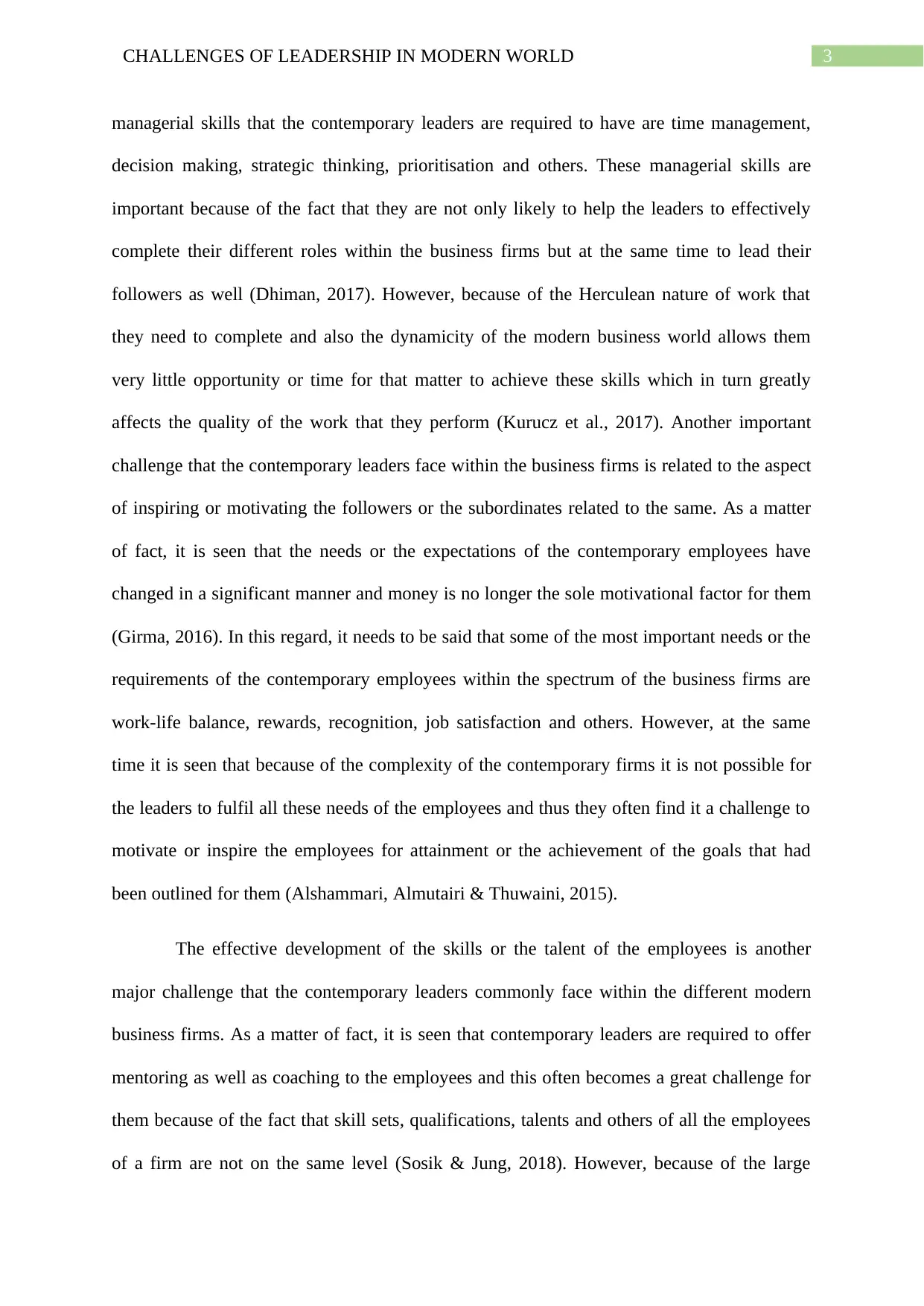
3CHALLENGES OF LEADERSHIP IN MODERN WORLD
managerial skills that the contemporary leaders are required to have are time management,
decision making, strategic thinking, prioritisation and others. These managerial skills are
important because of the fact that they are not only likely to help the leaders to effectively
complete their different roles within the business firms but at the same time to lead their
followers as well (Dhiman, 2017). However, because of the Herculean nature of work that
they need to complete and also the dynamicity of the modern business world allows them
very little opportunity or time for that matter to achieve these skills which in turn greatly
affects the quality of the work that they perform (Kurucz et al., 2017). Another important
challenge that the contemporary leaders face within the business firms is related to the aspect
of inspiring or motivating the followers or the subordinates related to the same. As a matter
of fact, it is seen that the needs or the expectations of the contemporary employees have
changed in a significant manner and money is no longer the sole motivational factor for them
(Girma, 2016). In this regard, it needs to be said that some of the most important needs or the
requirements of the contemporary employees within the spectrum of the business firms are
work-life balance, rewards, recognition, job satisfaction and others. However, at the same
time it is seen that because of the complexity of the contemporary firms it is not possible for
the leaders to fulfil all these needs of the employees and thus they often find it a challenge to
motivate or inspire the employees for attainment or the achievement of the goals that had
been outlined for them (Alshammari, Almutairi & Thuwaini, 2015).
The effective development of the skills or the talent of the employees is another
major challenge that the contemporary leaders commonly face within the different modern
business firms. As a matter of fact, it is seen that contemporary leaders are required to offer
mentoring as well as coaching to the employees and this often becomes a great challenge for
them because of the fact that skill sets, qualifications, talents and others of all the employees
of a firm are not on the same level (Sosik & Jung, 2018). However, because of the large
managerial skills that the contemporary leaders are required to have are time management,
decision making, strategic thinking, prioritisation and others. These managerial skills are
important because of the fact that they are not only likely to help the leaders to effectively
complete their different roles within the business firms but at the same time to lead their
followers as well (Dhiman, 2017). However, because of the Herculean nature of work that
they need to complete and also the dynamicity of the modern business world allows them
very little opportunity or time for that matter to achieve these skills which in turn greatly
affects the quality of the work that they perform (Kurucz et al., 2017). Another important
challenge that the contemporary leaders face within the business firms is related to the aspect
of inspiring or motivating the followers or the subordinates related to the same. As a matter
of fact, it is seen that the needs or the expectations of the contemporary employees have
changed in a significant manner and money is no longer the sole motivational factor for them
(Girma, 2016). In this regard, it needs to be said that some of the most important needs or the
requirements of the contemporary employees within the spectrum of the business firms are
work-life balance, rewards, recognition, job satisfaction and others. However, at the same
time it is seen that because of the complexity of the contemporary firms it is not possible for
the leaders to fulfil all these needs of the employees and thus they often find it a challenge to
motivate or inspire the employees for attainment or the achievement of the goals that had
been outlined for them (Alshammari, Almutairi & Thuwaini, 2015).
The effective development of the skills or the talent of the employees is another
major challenge that the contemporary leaders commonly face within the different modern
business firms. As a matter of fact, it is seen that contemporary leaders are required to offer
mentoring as well as coaching to the employees and this often becomes a great challenge for
them because of the fact that skill sets, qualifications, talents and others of all the employees
of a firm are not on the same level (Sosik & Jung, 2018). However, because of the large
Paraphrase This Document
Need a fresh take? Get an instant paraphrase of this document with our AI Paraphraser
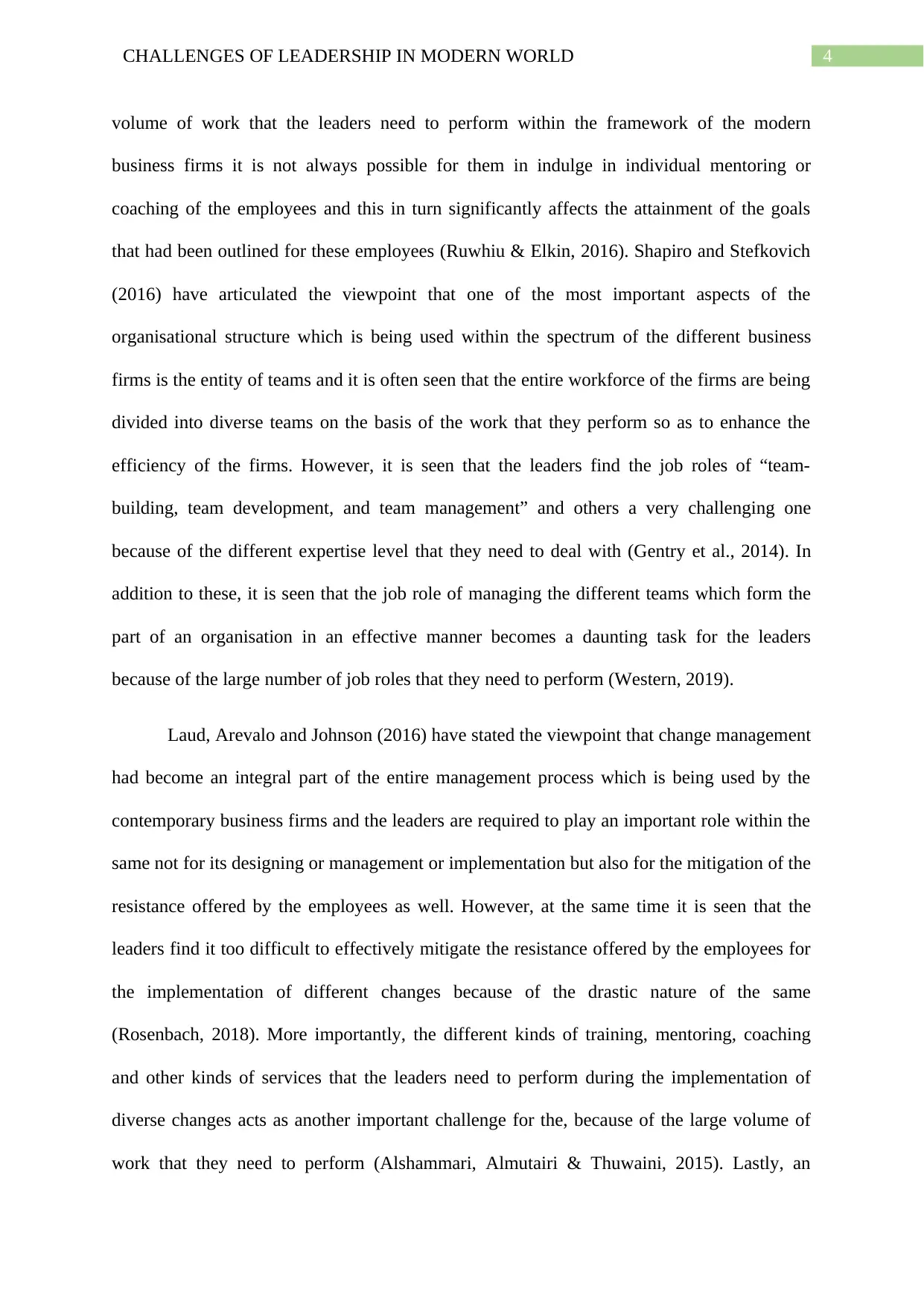
4CHALLENGES OF LEADERSHIP IN MODERN WORLD
volume of work that the leaders need to perform within the framework of the modern
business firms it is not always possible for them in indulge in individual mentoring or
coaching of the employees and this in turn significantly affects the attainment of the goals
that had been outlined for these employees (Ruwhiu & Elkin, 2016). Shapiro and Stefkovich
(2016) have articulated the viewpoint that one of the most important aspects of the
organisational structure which is being used within the spectrum of the different business
firms is the entity of teams and it is often seen that the entire workforce of the firms are being
divided into diverse teams on the basis of the work that they perform so as to enhance the
efficiency of the firms. However, it is seen that the leaders find the job roles of “team-
building, team development, and team management” and others a very challenging one
because of the different expertise level that they need to deal with (Gentry et al., 2014). In
addition to these, it is seen that the job role of managing the different teams which form the
part of an organisation in an effective manner becomes a daunting task for the leaders
because of the large number of job roles that they need to perform (Western, 2019).
Laud, Arevalo and Johnson (2016) have stated the viewpoint that change management
had become an integral part of the entire management process which is being used by the
contemporary business firms and the leaders are required to play an important role within the
same not for its designing or management or implementation but also for the mitigation of the
resistance offered by the employees as well. However, at the same time it is seen that the
leaders find it too difficult to effectively mitigate the resistance offered by the employees for
the implementation of different changes because of the drastic nature of the same
(Rosenbach, 2018). More importantly, the different kinds of training, mentoring, coaching
and other kinds of services that the leaders need to perform during the implementation of
diverse changes acts as another important challenge for the, because of the large volume of
work that they need to perform (Alshammari, Almutairi & Thuwaini, 2015). Lastly, an
volume of work that the leaders need to perform within the framework of the modern
business firms it is not always possible for them in indulge in individual mentoring or
coaching of the employees and this in turn significantly affects the attainment of the goals
that had been outlined for these employees (Ruwhiu & Elkin, 2016). Shapiro and Stefkovich
(2016) have articulated the viewpoint that one of the most important aspects of the
organisational structure which is being used within the spectrum of the different business
firms is the entity of teams and it is often seen that the entire workforce of the firms are being
divided into diverse teams on the basis of the work that they perform so as to enhance the
efficiency of the firms. However, it is seen that the leaders find the job roles of “team-
building, team development, and team management” and others a very challenging one
because of the different expertise level that they need to deal with (Gentry et al., 2014). In
addition to these, it is seen that the job role of managing the different teams which form the
part of an organisation in an effective manner becomes a daunting task for the leaders
because of the large number of job roles that they need to perform (Western, 2019).
Laud, Arevalo and Johnson (2016) have stated the viewpoint that change management
had become an integral part of the entire management process which is being used by the
contemporary business firms and the leaders are required to play an important role within the
same not for its designing or management or implementation but also for the mitigation of the
resistance offered by the employees as well. However, at the same time it is seen that the
leaders find it too difficult to effectively mitigate the resistance offered by the employees for
the implementation of different changes because of the drastic nature of the same
(Rosenbach, 2018). More importantly, the different kinds of training, mentoring, coaching
and other kinds of services that the leaders need to perform during the implementation of
diverse changes acts as another important challenge for the, because of the large volume of
work that they need to perform (Alshammari, Almutairi & Thuwaini, 2015). Lastly, an
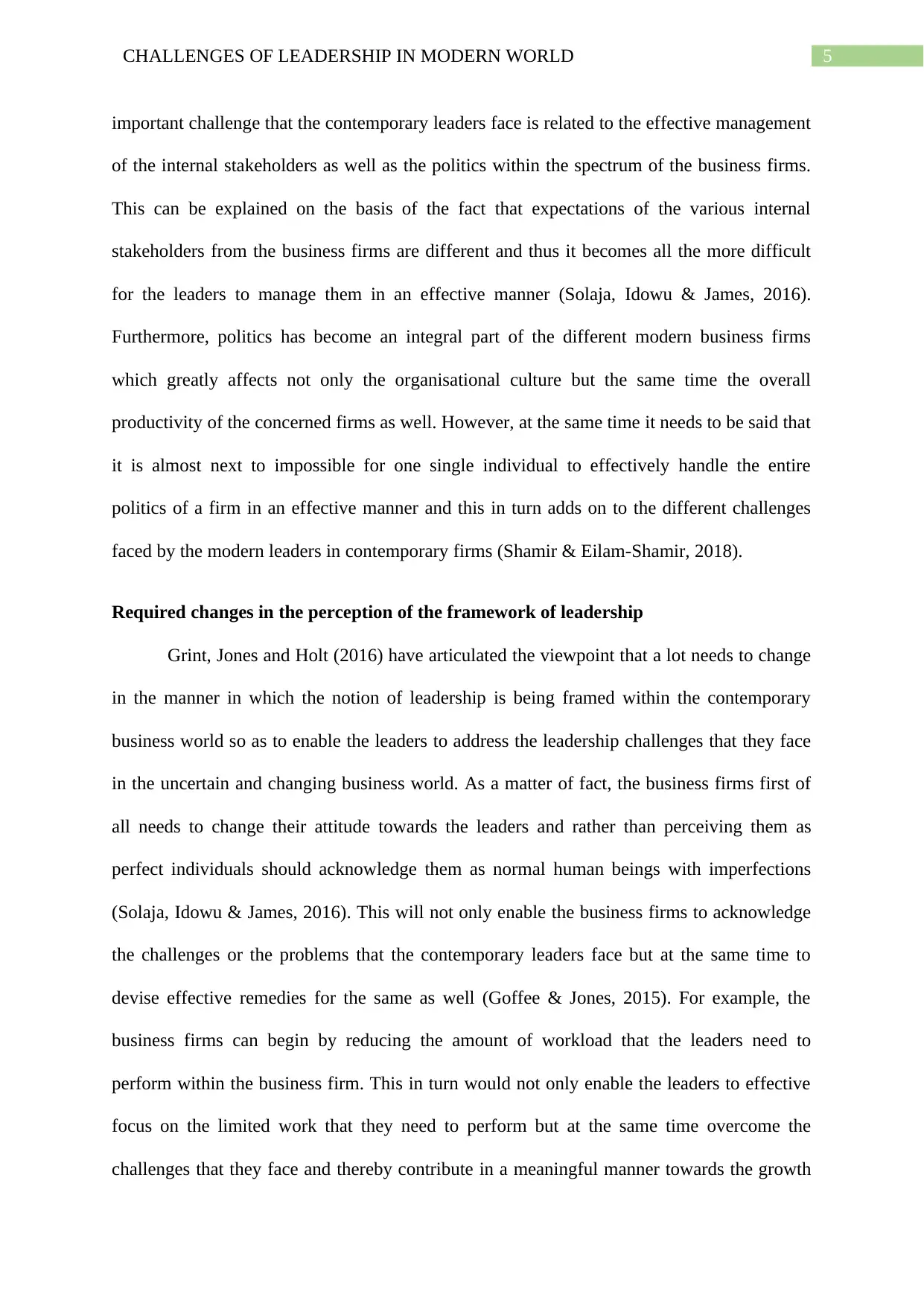
5CHALLENGES OF LEADERSHIP IN MODERN WORLD
important challenge that the contemporary leaders face is related to the effective management
of the internal stakeholders as well as the politics within the spectrum of the business firms.
This can be explained on the basis of the fact that expectations of the various internal
stakeholders from the business firms are different and thus it becomes all the more difficult
for the leaders to manage them in an effective manner (Solaja, Idowu & James, 2016).
Furthermore, politics has become an integral part of the different modern business firms
which greatly affects not only the organisational culture but the same time the overall
productivity of the concerned firms as well. However, at the same time it needs to be said that
it is almost next to impossible for one single individual to effectively handle the entire
politics of a firm in an effective manner and this in turn adds on to the different challenges
faced by the modern leaders in contemporary firms (Shamir & Eilam-Shamir, 2018).
Required changes in the perception of the framework of leadership
Grint, Jones and Holt (2016) have articulated the viewpoint that a lot needs to change
in the manner in which the notion of leadership is being framed within the contemporary
business world so as to enable the leaders to address the leadership challenges that they face
in the uncertain and changing business world. As a matter of fact, the business firms first of
all needs to change their attitude towards the leaders and rather than perceiving them as
perfect individuals should acknowledge them as normal human beings with imperfections
(Solaja, Idowu & James, 2016). This will not only enable the business firms to acknowledge
the challenges or the problems that the contemporary leaders face but at the same time to
devise effective remedies for the same as well (Goffee & Jones, 2015). For example, the
business firms can begin by reducing the amount of workload that the leaders need to
perform within the business firm. This in turn would not only enable the leaders to effective
focus on the limited work that they need to perform but at the same time overcome the
challenges that they face and thereby contribute in a meaningful manner towards the growth
important challenge that the contemporary leaders face is related to the effective management
of the internal stakeholders as well as the politics within the spectrum of the business firms.
This can be explained on the basis of the fact that expectations of the various internal
stakeholders from the business firms are different and thus it becomes all the more difficult
for the leaders to manage them in an effective manner (Solaja, Idowu & James, 2016).
Furthermore, politics has become an integral part of the different modern business firms
which greatly affects not only the organisational culture but the same time the overall
productivity of the concerned firms as well. However, at the same time it needs to be said that
it is almost next to impossible for one single individual to effectively handle the entire
politics of a firm in an effective manner and this in turn adds on to the different challenges
faced by the modern leaders in contemporary firms (Shamir & Eilam-Shamir, 2018).
Required changes in the perception of the framework of leadership
Grint, Jones and Holt (2016) have articulated the viewpoint that a lot needs to change
in the manner in which the notion of leadership is being framed within the contemporary
business world so as to enable the leaders to address the leadership challenges that they face
in the uncertain and changing business world. As a matter of fact, the business firms first of
all needs to change their attitude towards the leaders and rather than perceiving them as
perfect individuals should acknowledge them as normal human beings with imperfections
(Solaja, Idowu & James, 2016). This will not only enable the business firms to acknowledge
the challenges or the problems that the contemporary leaders face but at the same time to
devise effective remedies for the same as well (Goffee & Jones, 2015). For example, the
business firms can begin by reducing the amount of workload that the leaders need to
perform within the business firm. This in turn would not only enable the leaders to effective
focus on the limited work that they need to perform but at the same time overcome the
challenges that they face and thereby contribute in a meaningful manner towards the growth
⊘ This is a preview!⊘
Do you want full access?
Subscribe today to unlock all pages.

Trusted by 1+ million students worldwide
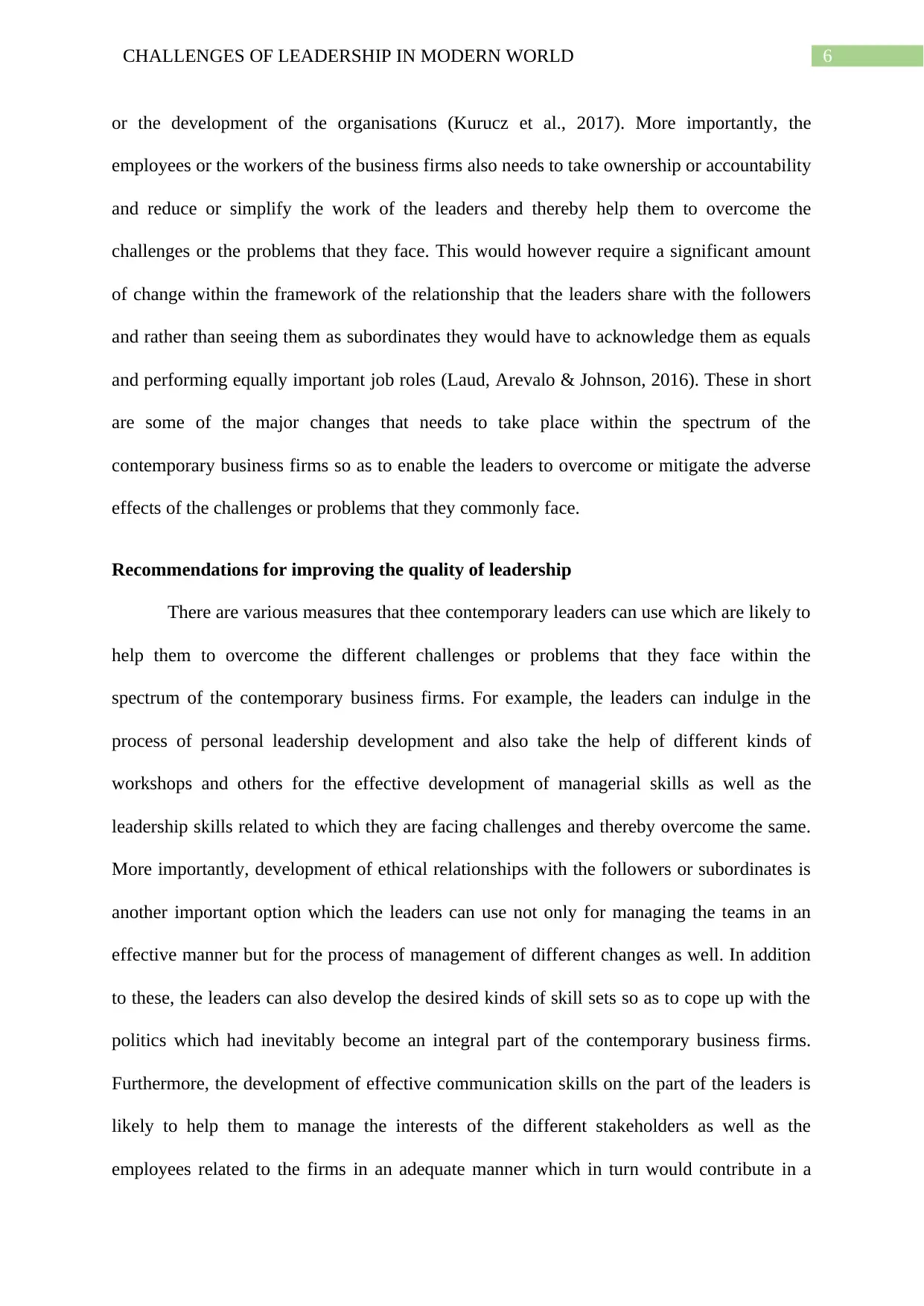
6CHALLENGES OF LEADERSHIP IN MODERN WORLD
or the development of the organisations (Kurucz et al., 2017). More importantly, the
employees or the workers of the business firms also needs to take ownership or accountability
and reduce or simplify the work of the leaders and thereby help them to overcome the
challenges or the problems that they face. This would however require a significant amount
of change within the framework of the relationship that the leaders share with the followers
and rather than seeing them as subordinates they would have to acknowledge them as equals
and performing equally important job roles (Laud, Arevalo & Johnson, 2016). These in short
are some of the major changes that needs to take place within the spectrum of the
contemporary business firms so as to enable the leaders to overcome or mitigate the adverse
effects of the challenges or problems that they commonly face.
Recommendations for improving the quality of leadership
There are various measures that thee contemporary leaders can use which are likely to
help them to overcome the different challenges or problems that they face within the
spectrum of the contemporary business firms. For example, the leaders can indulge in the
process of personal leadership development and also take the help of different kinds of
workshops and others for the effective development of managerial skills as well as the
leadership skills related to which they are facing challenges and thereby overcome the same.
More importantly, development of ethical relationships with the followers or subordinates is
another important option which the leaders can use not only for managing the teams in an
effective manner but for the process of management of different changes as well. In addition
to these, the leaders can also develop the desired kinds of skill sets so as to cope up with the
politics which had inevitably become an integral part of the contemporary business firms.
Furthermore, the development of effective communication skills on the part of the leaders is
likely to help them to manage the interests of the different stakeholders as well as the
employees related to the firms in an adequate manner which in turn would contribute in a
or the development of the organisations (Kurucz et al., 2017). More importantly, the
employees or the workers of the business firms also needs to take ownership or accountability
and reduce or simplify the work of the leaders and thereby help them to overcome the
challenges or the problems that they face. This would however require a significant amount
of change within the framework of the relationship that the leaders share with the followers
and rather than seeing them as subordinates they would have to acknowledge them as equals
and performing equally important job roles (Laud, Arevalo & Johnson, 2016). These in short
are some of the major changes that needs to take place within the spectrum of the
contemporary business firms so as to enable the leaders to overcome or mitigate the adverse
effects of the challenges or problems that they commonly face.
Recommendations for improving the quality of leadership
There are various measures that thee contemporary leaders can use which are likely to
help them to overcome the different challenges or problems that they face within the
spectrum of the contemporary business firms. For example, the leaders can indulge in the
process of personal leadership development and also take the help of different kinds of
workshops and others for the effective development of managerial skills as well as the
leadership skills related to which they are facing challenges and thereby overcome the same.
More importantly, development of ethical relationships with the followers or subordinates is
another important option which the leaders can use not only for managing the teams in an
effective manner but for the process of management of different changes as well. In addition
to these, the leaders can also develop the desired kinds of skill sets so as to cope up with the
politics which had inevitably become an integral part of the contemporary business firms.
Furthermore, the development of effective communication skills on the part of the leaders is
likely to help them to manage the interests of the different stakeholders as well as the
employees related to the firms in an adequate manner which in turn would contribute in a
Paraphrase This Document
Need a fresh take? Get an instant paraphrase of this document with our AI Paraphraser
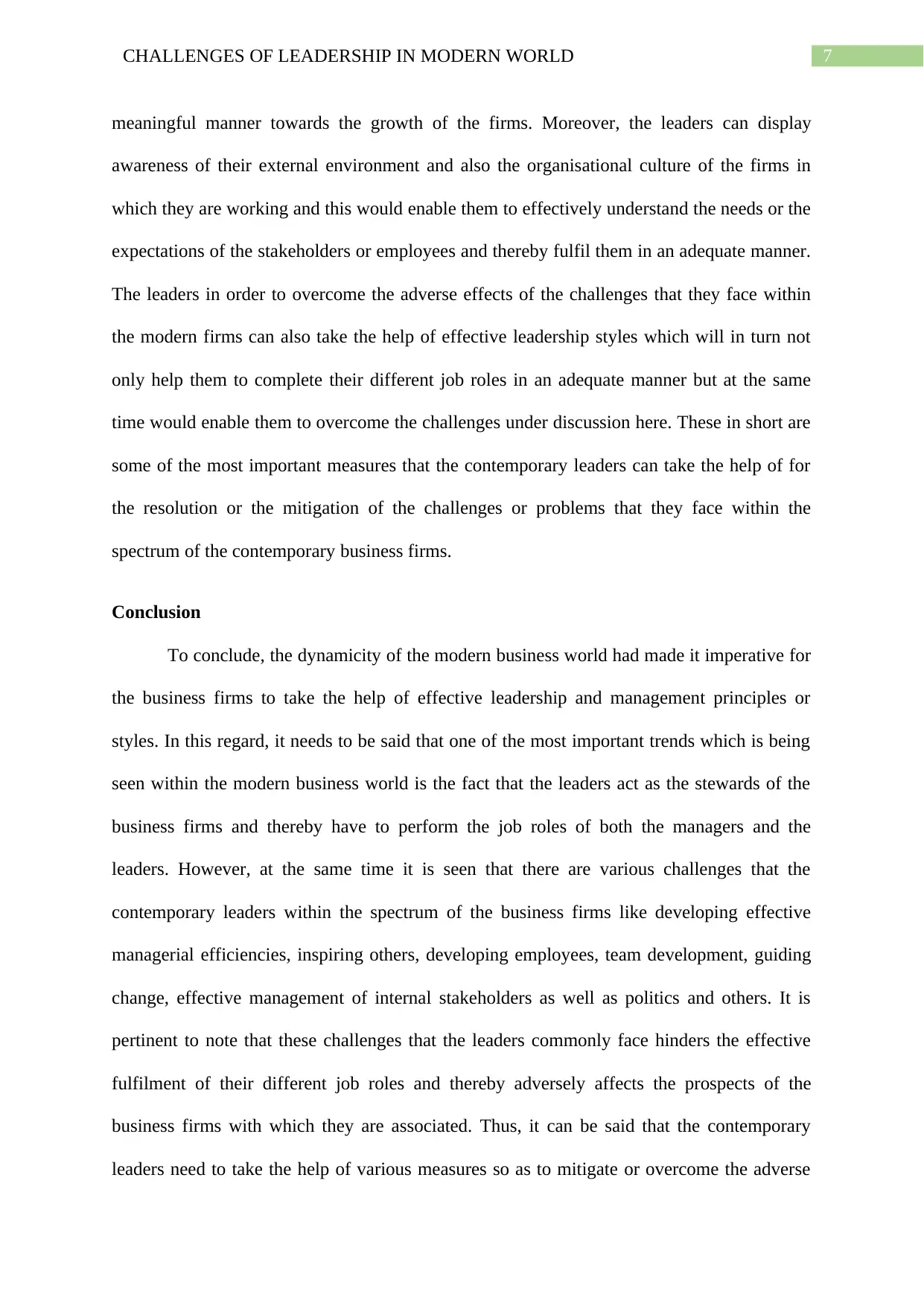
7CHALLENGES OF LEADERSHIP IN MODERN WORLD
meaningful manner towards the growth of the firms. Moreover, the leaders can display
awareness of their external environment and also the organisational culture of the firms in
which they are working and this would enable them to effectively understand the needs or the
expectations of the stakeholders or employees and thereby fulfil them in an adequate manner.
The leaders in order to overcome the adverse effects of the challenges that they face within
the modern firms can also take the help of effective leadership styles which will in turn not
only help them to complete their different job roles in an adequate manner but at the same
time would enable them to overcome the challenges under discussion here. These in short are
some of the most important measures that the contemporary leaders can take the help of for
the resolution or the mitigation of the challenges or problems that they face within the
spectrum of the contemporary business firms.
Conclusion
To conclude, the dynamicity of the modern business world had made it imperative for
the business firms to take the help of effective leadership and management principles or
styles. In this regard, it needs to be said that one of the most important trends which is being
seen within the modern business world is the fact that the leaders act as the stewards of the
business firms and thereby have to perform the job roles of both the managers and the
leaders. However, at the same time it is seen that there are various challenges that the
contemporary leaders within the spectrum of the business firms like developing effective
managerial efficiencies, inspiring others, developing employees, team development, guiding
change, effective management of internal stakeholders as well as politics and others. It is
pertinent to note that these challenges that the leaders commonly face hinders the effective
fulfilment of their different job roles and thereby adversely affects the prospects of the
business firms with which they are associated. Thus, it can be said that the contemporary
leaders need to take the help of various measures so as to mitigate or overcome the adverse
meaningful manner towards the growth of the firms. Moreover, the leaders can display
awareness of their external environment and also the organisational culture of the firms in
which they are working and this would enable them to effectively understand the needs or the
expectations of the stakeholders or employees and thereby fulfil them in an adequate manner.
The leaders in order to overcome the adverse effects of the challenges that they face within
the modern firms can also take the help of effective leadership styles which will in turn not
only help them to complete their different job roles in an adequate manner but at the same
time would enable them to overcome the challenges under discussion here. These in short are
some of the most important measures that the contemporary leaders can take the help of for
the resolution or the mitigation of the challenges or problems that they face within the
spectrum of the contemporary business firms.
Conclusion
To conclude, the dynamicity of the modern business world had made it imperative for
the business firms to take the help of effective leadership and management principles or
styles. In this regard, it needs to be said that one of the most important trends which is being
seen within the modern business world is the fact that the leaders act as the stewards of the
business firms and thereby have to perform the job roles of both the managers and the
leaders. However, at the same time it is seen that there are various challenges that the
contemporary leaders within the spectrum of the business firms like developing effective
managerial efficiencies, inspiring others, developing employees, team development, guiding
change, effective management of internal stakeholders as well as politics and others. It is
pertinent to note that these challenges that the leaders commonly face hinders the effective
fulfilment of their different job roles and thereby adversely affects the prospects of the
business firms with which they are associated. Thus, it can be said that the contemporary
leaders need to take the help of various measures so as to mitigate or overcome the adverse
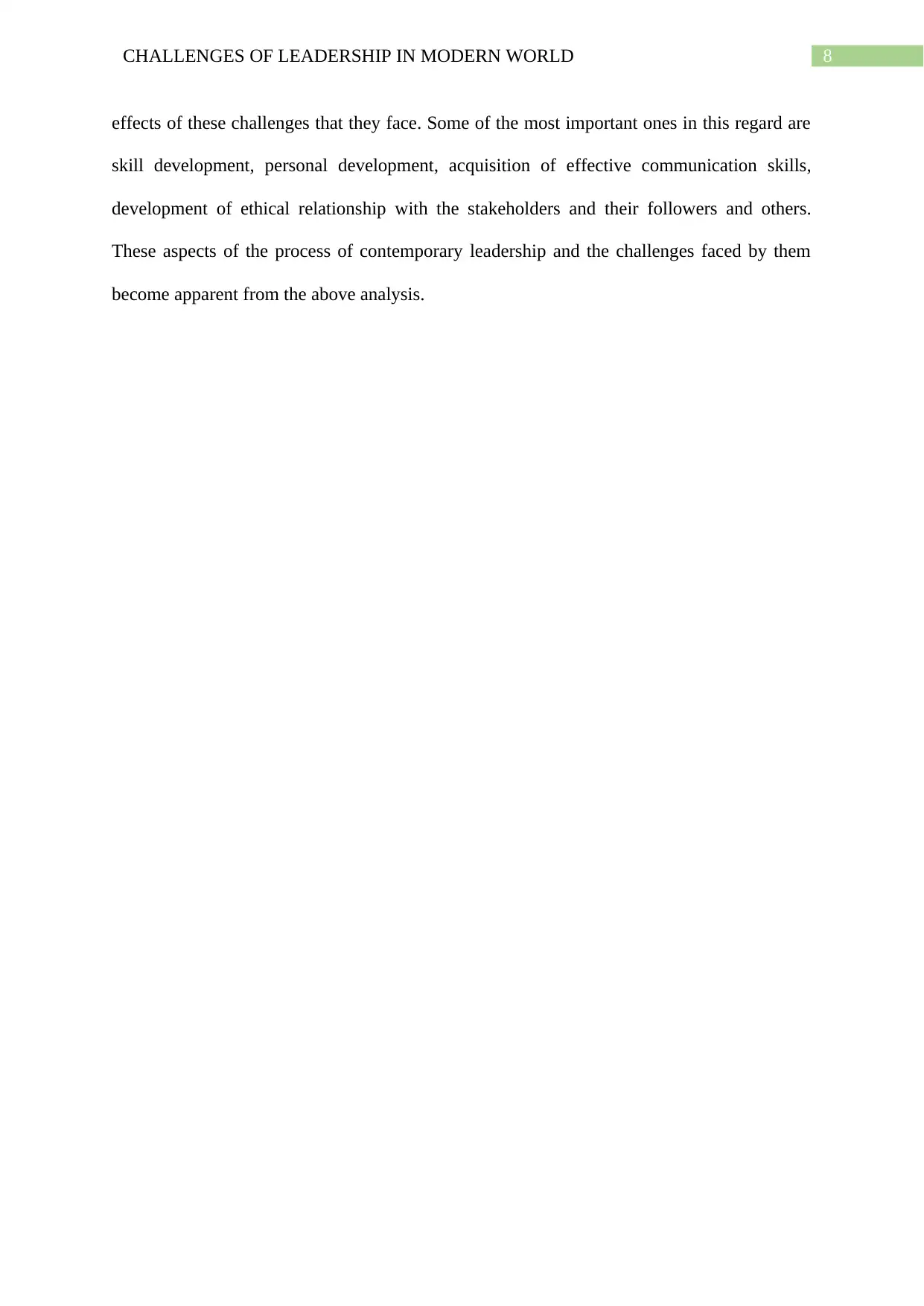
8CHALLENGES OF LEADERSHIP IN MODERN WORLD
effects of these challenges that they face. Some of the most important ones in this regard are
skill development, personal development, acquisition of effective communication skills,
development of ethical relationship with the stakeholders and their followers and others.
These aspects of the process of contemporary leadership and the challenges faced by them
become apparent from the above analysis.
effects of these challenges that they face. Some of the most important ones in this regard are
skill development, personal development, acquisition of effective communication skills,
development of ethical relationship with the stakeholders and their followers and others.
These aspects of the process of contemporary leadership and the challenges faced by them
become apparent from the above analysis.
⊘ This is a preview!⊘
Do you want full access?
Subscribe today to unlock all pages.

Trusted by 1+ million students worldwide
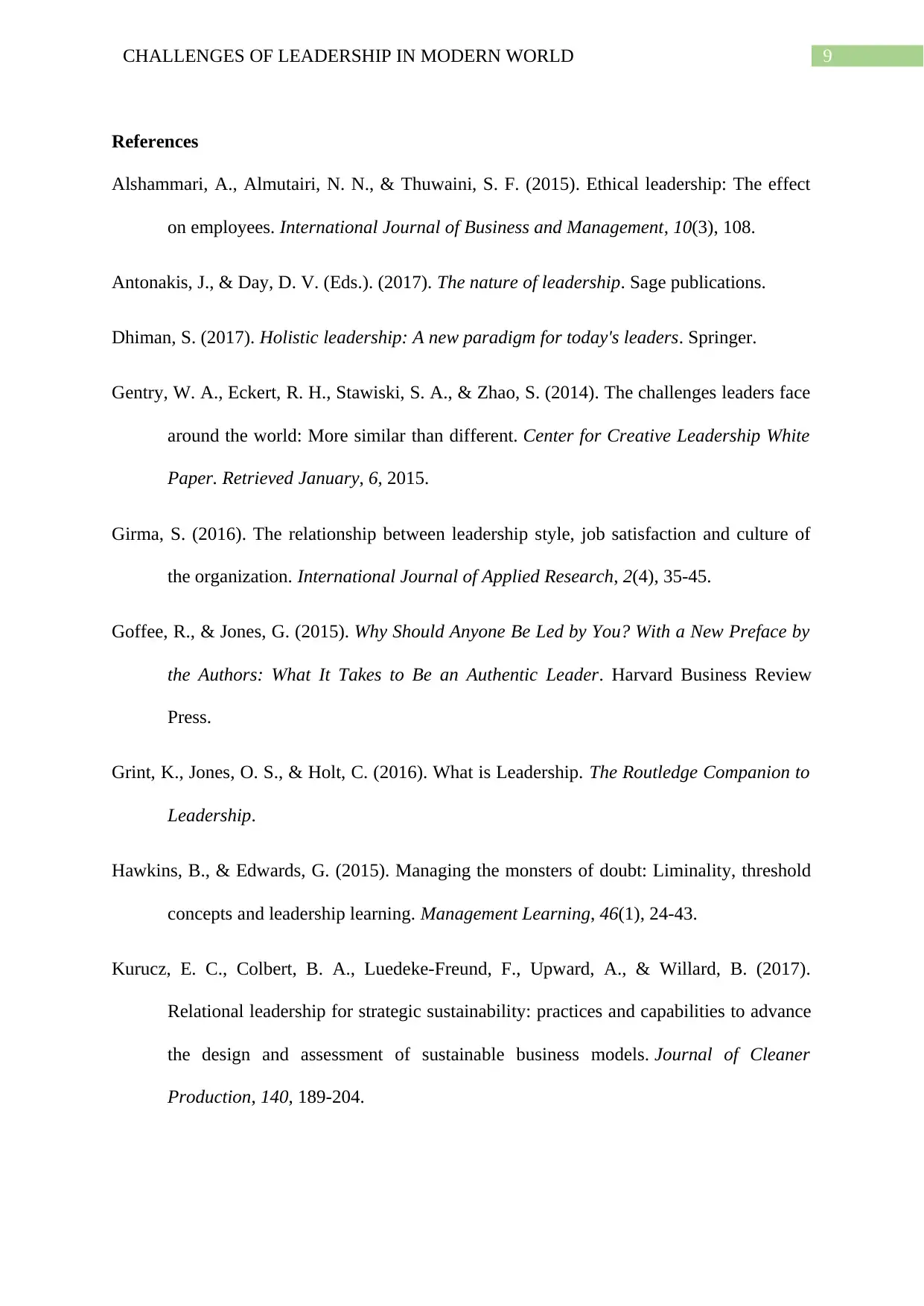
9CHALLENGES OF LEADERSHIP IN MODERN WORLD
References
Alshammari, A., Almutairi, N. N., & Thuwaini, S. F. (2015). Ethical leadership: The effect
on employees. International Journal of Business and Management, 10(3), 108.
Antonakis, J., & Day, D. V. (Eds.). (2017). The nature of leadership. Sage publications.
Dhiman, S. (2017). Holistic leadership: A new paradigm for today's leaders. Springer.
Gentry, W. A., Eckert, R. H., Stawiski, S. A., & Zhao, S. (2014). The challenges leaders face
around the world: More similar than different. Center for Creative Leadership White
Paper. Retrieved January, 6, 2015.
Girma, S. (2016). The relationship between leadership style, job satisfaction and culture of
the organization. International Journal of Applied Research, 2(4), 35-45.
Goffee, R., & Jones, G. (2015). Why Should Anyone Be Led by You? With a New Preface by
the Authors: What It Takes to Be an Authentic Leader. Harvard Business Review
Press.
Grint, K., Jones, O. S., & Holt, C. (2016). What is Leadership. The Routledge Companion to
Leadership.
Hawkins, B., & Edwards, G. (2015). Managing the monsters of doubt: Liminality, threshold
concepts and leadership learning. Management Learning, 46(1), 24-43.
Kurucz, E. C., Colbert, B. A., Luedeke-Freund, F., Upward, A., & Willard, B. (2017).
Relational leadership for strategic sustainability: practices and capabilities to advance
the design and assessment of sustainable business models. Journal of Cleaner
Production, 140, 189-204.
References
Alshammari, A., Almutairi, N. N., & Thuwaini, S. F. (2015). Ethical leadership: The effect
on employees. International Journal of Business and Management, 10(3), 108.
Antonakis, J., & Day, D. V. (Eds.). (2017). The nature of leadership. Sage publications.
Dhiman, S. (2017). Holistic leadership: A new paradigm for today's leaders. Springer.
Gentry, W. A., Eckert, R. H., Stawiski, S. A., & Zhao, S. (2014). The challenges leaders face
around the world: More similar than different. Center for Creative Leadership White
Paper. Retrieved January, 6, 2015.
Girma, S. (2016). The relationship between leadership style, job satisfaction and culture of
the organization. International Journal of Applied Research, 2(4), 35-45.
Goffee, R., & Jones, G. (2015). Why Should Anyone Be Led by You? With a New Preface by
the Authors: What It Takes to Be an Authentic Leader. Harvard Business Review
Press.
Grint, K., Jones, O. S., & Holt, C. (2016). What is Leadership. The Routledge Companion to
Leadership.
Hawkins, B., & Edwards, G. (2015). Managing the monsters of doubt: Liminality, threshold
concepts and leadership learning. Management Learning, 46(1), 24-43.
Kurucz, E. C., Colbert, B. A., Luedeke-Freund, F., Upward, A., & Willard, B. (2017).
Relational leadership for strategic sustainability: practices and capabilities to advance
the design and assessment of sustainable business models. Journal of Cleaner
Production, 140, 189-204.
Paraphrase This Document
Need a fresh take? Get an instant paraphrase of this document with our AI Paraphraser
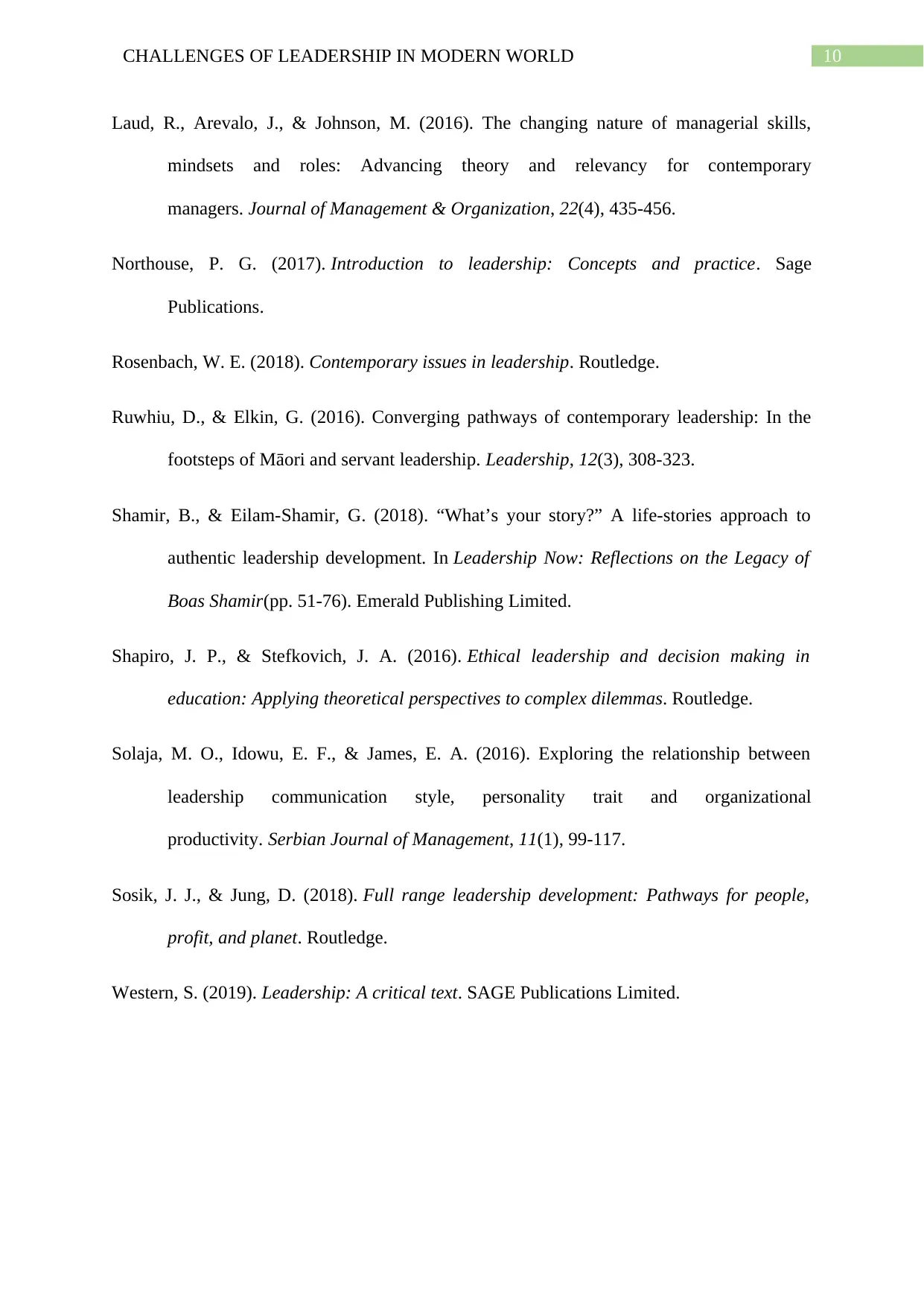
10CHALLENGES OF LEADERSHIP IN MODERN WORLD
Laud, R., Arevalo, J., & Johnson, M. (2016). The changing nature of managerial skills,
mindsets and roles: Advancing theory and relevancy for contemporary
managers. Journal of Management & Organization, 22(4), 435-456.
Northouse, P. G. (2017). Introduction to leadership: Concepts and practice. Sage
Publications.
Rosenbach, W. E. (2018). Contemporary issues in leadership. Routledge.
Ruwhiu, D., & Elkin, G. (2016). Converging pathways of contemporary leadership: In the
footsteps of Māori and servant leadership. Leadership, 12(3), 308-323.
Shamir, B., & Eilam-Shamir, G. (2018). “What’s your story?” A life-stories approach to
authentic leadership development. In Leadership Now: Reflections on the Legacy of
Boas Shamir(pp. 51-76). Emerald Publishing Limited.
Shapiro, J. P., & Stefkovich, J. A. (2016). Ethical leadership and decision making in
education: Applying theoretical perspectives to complex dilemmas. Routledge.
Solaja, M. O., Idowu, E. F., & James, E. A. (2016). Exploring the relationship between
leadership communication style, personality trait and organizational
productivity. Serbian Journal of Management, 11(1), 99-117.
Sosik, J. J., & Jung, D. (2018). Full range leadership development: Pathways for people,
profit, and planet. Routledge.
Western, S. (2019). Leadership: A critical text. SAGE Publications Limited.
Laud, R., Arevalo, J., & Johnson, M. (2016). The changing nature of managerial skills,
mindsets and roles: Advancing theory and relevancy for contemporary
managers. Journal of Management & Organization, 22(4), 435-456.
Northouse, P. G. (2017). Introduction to leadership: Concepts and practice. Sage
Publications.
Rosenbach, W. E. (2018). Contemporary issues in leadership. Routledge.
Ruwhiu, D., & Elkin, G. (2016). Converging pathways of contemporary leadership: In the
footsteps of Māori and servant leadership. Leadership, 12(3), 308-323.
Shamir, B., & Eilam-Shamir, G. (2018). “What’s your story?” A life-stories approach to
authentic leadership development. In Leadership Now: Reflections on the Legacy of
Boas Shamir(pp. 51-76). Emerald Publishing Limited.
Shapiro, J. P., & Stefkovich, J. A. (2016). Ethical leadership and decision making in
education: Applying theoretical perspectives to complex dilemmas. Routledge.
Solaja, M. O., Idowu, E. F., & James, E. A. (2016). Exploring the relationship between
leadership communication style, personality trait and organizational
productivity. Serbian Journal of Management, 11(1), 99-117.
Sosik, J. J., & Jung, D. (2018). Full range leadership development: Pathways for people,
profit, and planet. Routledge.
Western, S. (2019). Leadership: A critical text. SAGE Publications Limited.
1 out of 11
Related Documents
Your All-in-One AI-Powered Toolkit for Academic Success.
+13062052269
info@desklib.com
Available 24*7 on WhatsApp / Email
![[object Object]](/_next/static/media/star-bottom.7253800d.svg)
Unlock your academic potential
Copyright © 2020–2026 A2Z Services. All Rights Reserved. Developed and managed by ZUCOL.





